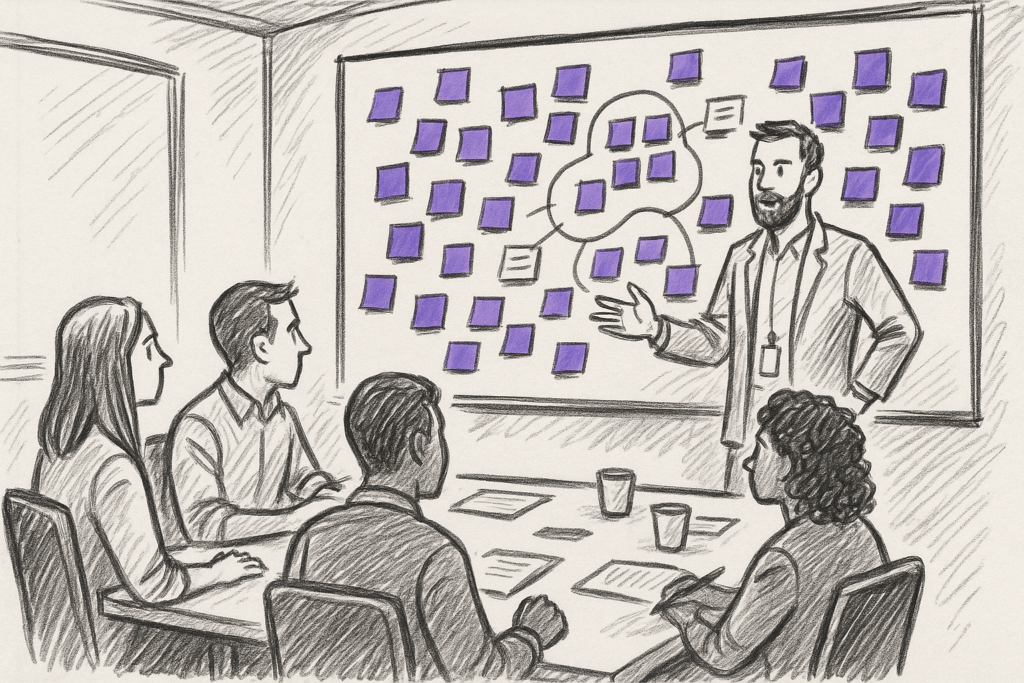In today’s fast-paced, competitive market, every decision counts. As a fully remote company, Fueled deeply understands and champions effective remote collaboration, leveraging best-in-class digital tools to minimize the toll on clients and maximize efficiency. Yet we’ve learned that strategic, concentrated in-person workshops, especially during critical phases like initial discovery and planning, can dramatically accelerate project timelines, deepen stakeholder alignment, and surface crucial insights often overlooked until it’s too late.
In fact, we’ve found that sometimes the best initial engagement with a client is a focused, strategic micro-project that leverages an in-person workshop combined with early-stage research. This helps clarify objectives, solidify strategies, and define project scopes accurately before committing to larger budgets or detailed execution plans.
Workshops Break Down Silos That Email Never Could
We’ve all watched projects stumble due to departmental disconnects. Information fragments across email chains, with critical context lost between teams. Workshops create a shared space where representatives from different disciplines build mutual understanding in real-time. When designers, developers, stakeholders, and end-users occupy the same room, the cross-pollination of ideas happens organically. I’ve witnessed entrenched positions soften and innovative solutions emerge simply because people could see problems through their colleagues’ eyes.
Tools we deploy: Empathy Map, Role Play, Journey Map
They Surface the Unspoken Realities
Organizations harbor invisible currents—unwritten rules, histories of past initiatives, and political dynamics rarely captured in briefs or specifications. A thoughtfully facilitated workshop creates psychological safety for these realities to surface.
During one project for a financial services client, our team’s customer journey map encountered unexpected resistance. A carefully structured workshop revealed an institutional reluctance stemming from a past failed initiative—something no amount of documentation review could have uncovered. Addressing this underlying concern enabled productive forward momentum.
Tools we deploy: Storyboarding, Value Proposition Canvas, Magic Wand Exercise
Workshops Create Collective Ownership
Documents are consumed; workshops are experienced. When stakeholders actively participate in shaping solutions—mapping user journeys, prioritizing features, or identifying risks—they develop a sense of ownership unmatched by passive deliverables. The collaborative artifacts generated during workshops, from affinity diagrams to prioritization matrices, gain value from the shared experience of their creation. This collective ownership substantially boosts implementation success.
Tools we deploy: Affinity Map, Feature Prioritization, Five Whys
They Compress Decision Cycles
In traditional project workflows, feedback loops can stretch for weeks. A decision-maker reviews deliverables, provides comments, and awaits revisions. Workshops dramatically compress these cycles by integrating decision-makers into the generative process.
One of my public sector projects, a three-hour co-creation workshop achieved outcomes that months of document exchanges could not. With authority figures present during idea generation, assumptions were tested, immediate feedback gathered, and refinements made in real-time.
Tools we deploy: Eisenhower Matrix, Dot Voting, Kano Model, $100 Test
Workshops Build Trust Through Vulnerability
The most valuable workshops involve vulnerability—asking questions when you don’t know answers, sharing half-formed ideas, and acknowledging limitations. These authentic exchanges build trust among team members and stakeholders in ways polished presentations cannot. Throughout my career, the strongest client relationships have emerged from workshops where challenges were collaboratively navigated rather than merely solutions presented.
Tools we deploy: Crazy 8s, How Might We, Magic Circle, Innovation Funnel
They Integrate Different Thinking Styles
Projects benefit from both divergent thinking (generating options) and convergent thinking (making choices). Well-structured workshops intentionally move between these modes, ensuring creative exploration complements decisive action. By designing activities honoring diverse cognitive styles—from analytical exercises to visual thinking—we create room for robust outcomes.
Tools we deploy: Yes, And…, Rose Thorn Bud, Vision Cards, If Then
Getting Workshops Right: Key Considerations
While workshops offer tremendous value, their success isn’t automatic. Critical factors determining workshop effectiveness include:
- Clear purpose understood and embraced by participants
- Skilled facilitation ensuring inclusive and productive dialogue
- Appropriate constraints to inspire focused creativity
- Tangible outcomes directly informing next steps
- Robust follow-through translating momentum into concrete actions
Looking Forward: Investing in Future Success
Interested in understanding how workshops might enhance your next strategic initiative or planning session? Reach out—we’re happy to share our internal workshop guidebook and discuss how our methods can drive results for your project.
